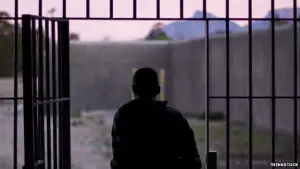Greg is a former prisoner who was recently released to perform his parole in a small town in California. Like all prisoners, freedom and reintegration into society was disorienting. Nevertheless, one of the first things he did in freedom was look for an Orthodox parish.
“I was still unfamiliar with the bus routes and schedules and I didn’t even know what time liturgy began as I walked toward the transit center, determined to find the Way, the Truth, and the Life,” recalls Greg about that first visit. Greg took a series of buses and walked to the parish where he experienced his very first Divine Liturgy. When he was approached by a parishioner who asked how he had learned about the Orthodox Church, Greg admitted that he had learned about it while in prison. The parishioner responded with kindness and offered to give Greg a tour of the church and introduce him to the parish priest. The parishioner probably does not know just how pivotal his actions were. Had he rejected Greg, Greg might have rejected the Orthodox Church.
When a prisoner is released, it can take him or her three years or more to fully transition to a life of freedom. The harshness of prison life leaves a residue that presents its own challenges. For example, a prisoner is on high alert while in prison because of the constant danger of being assaulted. When he is released, that sense of being on maximum alert may still be with him and he can easily get into fights and trouble with the law because of that extreme sensitivity.
In addition, while in prison, a prisoner experiences no privacy whatsoever. He lives as if in a fish bowl. Consequently, he has an extreme need for a living space that will afford him the privacy that will help him find himself again. This creates a guardedness that can create problems in family relationships because the family has missed him and will want to resume a relationship as soon as possible.
It has been found that the greatest factor of success for the released prisoner is not the resources he is given on leaving (such as assistance in securing a place to live) but rather the way he spent his time while in prison. Greg, for example, became deeply involved with Orthodox Christian Prison Ministry. This helped “center” him in freedom because those years of studying the Orthodox faith made him want to experience the Orthodox Church as soon as he was released. Experts say that it is the prisoner who makes it a priority to find a church home who will most likely succeed in freedom.
How many of us would have had Greg’s determination to attend church when we had no car for a five mile journey? That determination bodes well for Greg and his chances of succeeding in freedom.

